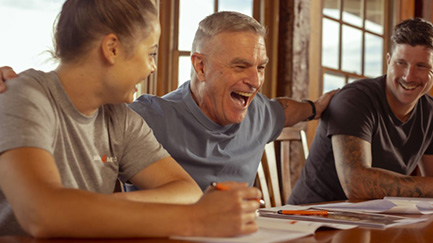
How to exercise your resilience muscle
While change is an inevitable part of life, it can sometimes stir up feelings of uncertainty. By understanding how we respond to change, we can strengthen our ability to cope and become more resilient.

Tai Chi and yoga are gentle, slow-moving practices that use meditation and a focus on breathwork to aid in treating both physical and mental conditions.
Often used as complementary therapy techniques, these practices have been proven to have positive effects in reducing chronic pain, strengthening joints, and reducing symptoms of mental health conditions such as depression.
The difference between Tai Chi and yoga
While Tai Chi and yoga have similar benefits and components, the main differences include how the movement is performed and the focus of the activity.
Yoga involves holding poses and postures with a focus on flexibility, whereas Tai Chi is a more dance-like martial art form that has a focus on dynamic range of motion, strength and balance.
Tai Chi is generally more suitable for individuals with injuries, joint issues, or balance concerns as it can be gentler than yoga. However, as people progress with the movements and can challenge themselves further, Tai Chi may become more physically demanding than yoga.
The benefits of Tai Chi and yoga
There is a range of mental and physical health benefits to these two practices, including:
There is also excellent evidence for the benefits of Tai Chi rehabilitation for specific conditions including osteoarthritis, Parkinson’s disease, chronic obstructive pulmonary disease (COPD), as well as good evidence for helping to treat depression, cardiac conditions, strokes, and dementia.
The benefits of Tai Chi and yoga for veterans
The main difference to be considered between veterans and civilians practicing Tai Chi or yoga is the complex nature of injuries or mental effects that are seen in Defence Force personnel. Veterans are more likely to present with multiple physical, sociological and psychological conditions that have a cross-over effect on their health.
Tai Chi or yoga are both great places to start for a gentler approach to musculoskeletal conditions and persistent pain, while also focusing on mindfulness and meditation to help with symptoms of depression.
The Mates4Mates Townsville team recently ran a Tai Chi program for veterans and family members which received lots of positive feedback, including a noticeable difference in memory retention, reduced joint pain, and a big call for more slow-moving exercise classes.
Advice from an exercise physiologist
When starting Tai Chi and yoga as a beginner, especially if facing injury or pain, the best advice is to go low and slow. There’s no need to jump in full steam ahead and risk worsening any injuries, as it may also mean you miss out on the amazing benefits of these practices.
If you are unsure on where to start and whether these practices will be beneficial for conditions you are facing, reach out to your GP, an exercise physiologist, or Mates4Mates for guidance.
Support at Mates4Mates
As well as Tai Chi programs run by Mates4Mates exercise physiologists, trauma-informed yoga sessions are also available at most centres and online, focusing on simple meditation techniques and stretching to bring a sense of calmness to the mind and body.
To find out more, reach out to Mates4Mates on 1300 4 MATES (62 837) for a confidential chat with an exercise physiologist.
Written by Aric Visentin, Mates4Mates Exercise Physiologist

While change is an inevitable part of life, it can sometimes stir up feelings of uncertainty. By understanding how we respond to change, we can strengthen our ability to cope and become more resilient.